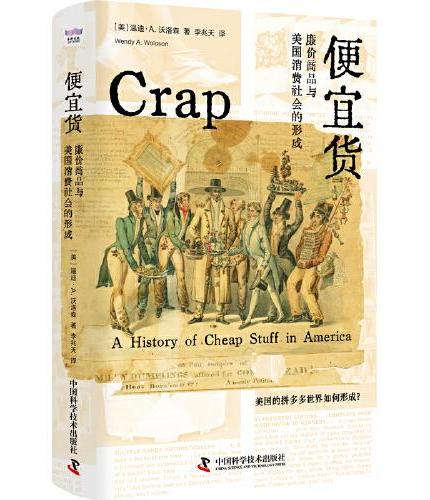新書推薦:

《
罗马政治观念中的自由
》
售價:NT$
230.0

《
中国王朝内争实录:宠位厮杀
》
售價:NT$
281.0

《
凡事发生皆有利于我(这是一本读了之后会让人运气变好的书”治愈无数读者的心理自助经典)
》
售價:NT$
203.0

《
未来特工局
》
售價:NT$
254.0

《
高术莫用(十周年纪念版 逝去的武林续篇 薛颠传世之作 武学尊师李仲轩家世 凸显京津地区一支世家的百年沉浮)
》
售價:NT$
250.0

《
英国简史(刘金源教授作品)
》
售價:NT$
449.0

《
便宜货:廉价商品与美国消费社会的形成
》
售價:NT$
352.0

《
读书是一辈子的事(2024年新版)
》
售價:NT$
352.0
|
| 內容簡介: |
|
《世界大师原典文库:论美国的民主(套装上下册)》是世界学术界第一部对美国社会、政治制度和民情进行社会学研究的著作,也是第一部论述民主制度的专著,19世纪最著名的社会学著作之一。上卷的第一部分讲述美国的政治制度,第二部分对美国的民主进行社会学的分析。下卷分四个部分,以美国为背景发挥其政治哲学和政治社会学思想。
|
| 關於作者: |
|
亚历克西·德·托克维尔(1805-1859),法国历史学家、社会学家。出身贵族世家,经历过五个“朝代”。早期热心于政治,1838年出任众议院议员,1848年二月革命后参与制订第二共和国宪法,1849年出任外交部长。1851年路易·波拿巴建立第二帝国,托克维尔对政治日益失望,逐渐淡出政治舞台,并意识到自己“擅长思想胜于行动”。主要代表作有《论美国的民主》、《旧制度与大革命》。
|
| 目錄:
|
Volume1
上卷导读
IntroductoryChapter
ChapterIExteriorFormofNorthAmerica
ChapterⅡOriginoftheAnglo-Americans
ChapterⅢSocialConditionsoftheAnglo-Americans
ChapterⅣThePrincipleoftheSovereigntyofthePeopleinAmerica
ChapterⅤNecessityofExaminingtheConditionoftheStates
ChapterⅥJudicialPowerintheUnitedStates
ChapterⅦPoliticalJurisdictionintheUnitedStates
ChapterⅧTheFederalConstitution
ChapterⅨWhythePeopleMayStrictlyBeSaidtoGovernintheUnitedStates
ChapterⅩPartiesintheUnitedStates
ChapterⅪLibertyofthePressintheUnitedStates
ChapterⅫPoliticalAssociationsintheUnitedStates
ChapterⅫⅠGovernmentoftheDemocracyinAmerica
ChapterⅩⅣAdvantagesAmericanSocietyDerivefromDemocracy
ChapterⅩⅤUnlimitedPowerofMajority,andItsConsequences
ChapterⅩⅥCausesMitigatingTyrannyintheUnitedStates
ChapterⅩⅦPrincipalCausesMaintainingtheDemocraticRepublic
ChapterⅩⅧFutureConditionofThreeRacesintheUnitedStates
Conclusion
Volume2
下卷导读
DeTocqueville’sPrafacetotheSecondVolume
BookOne InfluenceofDemocracyontheProgressofOpinionintheUnitedStates
ChapterIPhilosophicalMethodAmongtheAmericans
ChapterⅡOfthePrincipalSourceofBeliefAmongDemocraticNations
ChapterⅢWhytheAmericansDisplayMoreReadinessandMoreTasteforGeneralIdeasThanTheirForefathers,theEnglish
ChapterⅣWhytheAmericansHaveNeverBeenSoEagerastheFrenchforGeneralIdeasinPoliticalMatters
ChapterⅤOftheMannerinWhichReligionintheUnitedStatesAvailsItselfofDemocraticTendencies
ChapterⅥOftheProgressofRomanCatholicismintheUnitedStates
ChapterⅦOftheCauseofaLeaningtoPantheismAmongstDemocraticNations
ChapterⅧThePrincipleofEqualitySuggeststotheAmericanstheIdeaoftheIndefinitePerfectibilityofMan
ChapterⅨTheExampleoftheAmericansDoesNotProveThataDemocraticPeopleCanHaveNoAptitudeandNoTasteforScience,Literature,orArt
ChapterⅩWhytheAmericansAreMoreAddictedtoPracticalThantoTheoreticalScience
ChapterⅪOftheSpiritinWhichtheAmericansCultivatetheArts
ChapterⅫWhytheAmericansRaiseSomeMonumentsSoInsignificant,andOthersSoImportant
ChapterⅫⅠLiteraryCharacteristicsofDemocraticAges
ChapterⅩⅣTheTradeofLiterature
ChapterⅩⅤTheStudyofGreekandLatinLiteraturePeculiarlyUsefulinDemocraticCommunities
ChapterⅩⅥTheEffectofDemocracyonLanguage
ChapterⅩⅦOfSomeoftheSourcesofPoetryAmongstDemocraticNations
ChapterⅩⅧOftheInflatedStyleofAmericanWritersandOrators
ChapterⅩⅨSomeObservationsontheDramaAmongstDemocraticNations
ChapterⅩⅩCharacteristicsofHistoriansinDemocraticAges
ChapterⅩⅪOfParliamentaryEloquenceintheUnitedStates
BookTwo InfluenceofDemocracyontheFeelingsoftheAmericans
ChapterIWhyDemocraticNationsShowaMoreArdentandEnduringLoveofEqualityThanofLiberty
ChapterⅡOfIndividualisminDemocraticCountriesChapterⅢIndividualismStrongerattheCloseofaDemocraticRevolutionThanatOtherPeriods
ChapterⅣThattheAmericansCombattheEffectsofIndividualismbyFreeInstitutions
ChapterⅤOftheUseWhichtheAmericansMakeofPublicAssociationsinCivilLife
ChapterⅥOftheRelationBetweenPublicAssociationsandNewspapers
ChapterⅦConnectionofCivilandPoliticalAssociations
ChapterⅧTheAmericansCombatIndividualismbythePrincipleofInterestRightlyUnderstood
ChapterⅨThattheAmericansApplythePrincipleofInterestRightlyUnderstoodtoReligiousMatters
ChapterⅩOftheTasteforPhysicalWell-BeinginAmerica
ChapterⅪPeculiarEffectsoftheLoveofPhysicalGratificationsinDemocraticAges
ChapterⅫCausesofFanaticalEnthusiasminSomeAmericans
ChapterⅫⅠCausesoftheRestlessSpiritofAmericansintheMidstofTheirProsperity
ChapterⅩⅣTasteforPhysicalGratificationsUnitedinAmericatoLoveofFreedomandAttentiontoPublicAffairs
ChapterⅩⅤThatReligiousBeliefSometimesTurnstheThoughtsoftheAmericanstoImmaterialPleasures
ChapterⅩⅥThatExcessiveCareofWorldlyWelfareMayImpairThatWelfare
ChapterⅩⅦThatinTimesMarkedbyEqualityofConditionsandScepticalOpinions,ItIsImportanttoRemovetoaDistancetheObjectsofHumanActions
ChapterⅩⅧThatAmongsttheAmericansAllHonestCallingsAreHonorable
ChapterⅩⅨThatAlmostAlltheAmericansFollowIndustrialCallings
ChapterⅩⅩThatAristocracyMayBeEngenderedbyManufactures
BookThree InfluenceofDemocracyonManners,ProperlySoCalled
ChapterIThatMannersAreSoftenedasSocialConditionsBecomeMoreEqual
ChapterⅡThatDemocracyRenderstheHabitualIntercourseoftheAmericansSimpleandEasy
ChapterⅢWhytheAmericansShowSoLittleSensitivenessinTheirOwnCountry,andAreSoSensitiveinEurope
ChapterⅣConsequencesoftheThreePrecedingChapters
ChapterⅤHowDemocracyAffectstheRelationofMastersandServants
ChapterⅥThatDemocraticInstitutionsandMannersTendtoRaiseRentsandShortentheTermsofLeases
ChapterⅦInfluenceofDemocracyonWages
ChapterⅧInfluenceofDemocracyonKindred
ChapterⅨEducationofYoungWomenintheUnitedStates
ChapterⅩTheYoungWomenintheCharacterofaWife
ChapterⅪThattheEqualityofConditionsContributestotheMaintenanceofGoodMoralsinAmerica
ChapterⅫHowtheAmericansUnderstandtheEqualityoftheSexes
ChapterⅫⅠThatthePrincipleofEqualityNaturallyDividestheAmericansintoaNumberofSmallPrivateCircles
ChapterⅩⅣSomeReflectionsonAmericanManners
ChapterⅩⅤOftheGravityoftheAmericans,andWhyItDoesNotPreventThemfromOftenCommittingInconsiderateAction
ChapterⅩⅥWhytheNationalVanityoftheAmericansIsMoreRestlessandCaptiousThanThatoftheEnglish
ChapterⅩⅦThattheAspectofSocietyintheUnitedStatesIsatonceExcitedandMonotonous
ChapterⅩⅧOfHonorintheUnitedStatesandinDemocraticCommunities
ChapterⅩⅨWhySoManyAmbitiousMenandSoLittleLoftyAmbitionAretoBeFoundintheUnitedStates
ChapterⅩⅩTheTradeofPlace-HuntinginCertainDemocraticCountries
ChapterⅩⅪWhyGreatRevolutionsWillBecomeMoreRare
ChapterⅩⅫWhyDemocraticNationsAreNaturallyDesirousofPeace,andDemocraticArmiesofWar
ChapterⅩⅫⅠWhichIstheMostWarlikeandMostRevolutionaryClassinDemocraticArmies
ChapterⅩⅪⅤCausesWhichRenderDemocraticArmiesWeakerThanOtherArmiesattheOutsetofaCampaign,andMoreFormidableinProtractedWarfare
ChapterⅩⅩⅤOfDisciplineinDemocraticArmies
ChapterⅩⅩⅥSomeConsiderationsonWarinDemocraticCommunities
BookFour InfluenceofDemocraticOpinionsonPoliticalSociety
ChapterIThatEqualityNaturallyGivesMenaTasteforFreeInstitutions
ChapterⅡThattheNotionsofDemocraticNationsonGovernmentAreNaturallyFavorabletotheConcentrationofPower
ChapterⅢThattheSentimentsofDemocraticNationsAccordwithTheirOpinionsinLeadingThemtoConcentratePoliticalPower
ChapterⅣOfCertainPeculiarandAccidentalCausesWhichEitherLeadaPeopletoCompleteCentralizationofGovernment,orWhichDivertThemfromIt
ChapterⅤThatAmongsttheEuropeanNationsofOurTimethePowerofGovernmentsIsIncreasing,AlthoughthePersonsWhoGovernAreLessStable
ChapterⅥWhatSortofDespotismDemocraticNationsHavetoFear
ChapterⅦContinuationofthePrecedingChapters
ChapterⅧGeneralSurveyoftheSubject
Appendices
|
|










